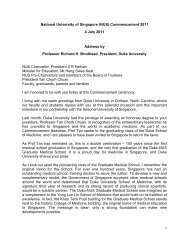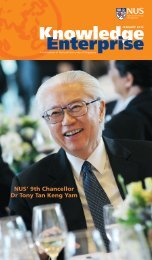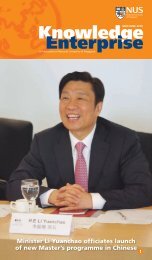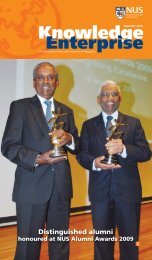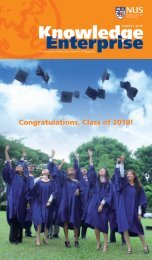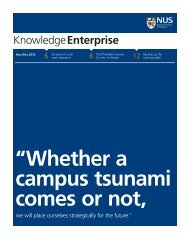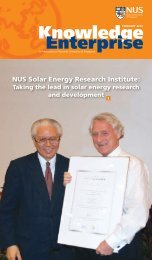Celebrating - NewsHub - National University of Singapore
Celebrating - NewsHub - National University of Singapore
Celebrating - NewsHub - National University of Singapore
- No tags were found...
Create successful ePaper yourself
Turn your PDF publications into a flip-book with our unique Google optimized e-Paper software.
GLOBAL HIGHLIGHTSAlberta Minister <strong>of</strong> Education visitsAlberta Minister <strong>of</strong> Education HonourableDave Hancock called on NUS on 8 July 2009 togain insights into the NUS educational system.Accompanying Mr Hancock on this visit areMr Spence Nichol, Strategic Policy Advisorfrom the Office <strong>of</strong> the Minister, Education,Alberta, Canada, and Ms Fumiko Kitano, SecondSecretary(Commercial) and Trade Commissionerat the High Commission <strong>of</strong> Canada to <strong>Singapore</strong>.During the visit, the team from Canada met withNUS President Pr<strong>of</strong> Tan Chorh Chuan, DeputyPresident (Academic Affairs) and Provost Pr<strong>of</strong> TanEng Chye, Tan Chin Tuan Centennial Pr<strong>of</strong>essorand Deputy President (Research and Technology)Pr<strong>of</strong> Barry Halliwell and Director, InternationalRelations Office, Assoc Pr<strong>of</strong> Anne Pakir.Mr Hancock was in <strong>Singapore</strong> as part <strong>of</strong> theinaugural International Education Roundtableheld jointly by the <strong>Singapore</strong> Ministry <strong>of</strong>Education and McKinsey & Company. Theroundtable, which was held from 6 to 8 July,looked into how education systems couldcontinuously improve so as to better equipstudents for the future. Other ministers andsenior government <strong>of</strong>ficials hailing fromAustralia, China, Hong Kong, Sweden and theUnited States also attended the roundtable.CANADIAN VISIT: Honourable Dave Hancock,Minister <strong>of</strong> Education, Alberta, Canada (left)with NUS President Pr<strong>of</strong> Tan Chorh Chuan.Saluted at <strong>National</strong> Medical Excellence Awards 2009Three doctors from the <strong>National</strong> <strong>University</strong> HealthSystem (NUHS) and one from Duke-NUS GraduateMedical School <strong>Singapore</strong> (Duke-NUS), have donevery well at the <strong>National</strong> Medical Excellence Awards2009, clinching most <strong>of</strong> the honours granted by the<strong>Singapore</strong> Ministry <strong>of</strong> Health. Graced by Minister forHealth Mr Khaw Boon Wan, the award ceremony washeld on 22 July 2009.On the recipients, Mr Khaw said: “They epitomisethe very best clinical, scientific and academic talentthat <strong>Singapore</strong> hopes to see more and more <strong>of</strong>.Through years <strong>of</strong> unwavering commitment, they havehelped build up core capabilities in their respectivespecialities.”care. The award also recognised Pr<strong>of</strong> Wong as amaster clinician who has supported and facilitatedresearch, and introduced novel/effective treatmentin his clinical practice. Pr<strong>of</strong> Wong is also Dean <strong>of</strong> theYong Loo Lin School <strong>of</strong> Medicine and Director andSenior Consultant <strong>of</strong> the <strong>National</strong> <strong>University</strong> CancerInstitute.Pr<strong>of</strong>s Chew Chong Lin and Low Poh Sim, both fromNUHS, were among the three recipients to receivethe <strong>National</strong> Outstanding Clinician Mentor Awardfor their mentorship <strong>of</strong> young clinicians and clinicianscientists in Dentistry and Paediatric Neurology,respectively.KNOWLEDGE ENTERPRISEThe <strong>National</strong> OutstandingClinician Scientist Awardwent to Pr<strong>of</strong> Michael CheeWei Liang <strong>of</strong> the Duke-NUS.He received the accolade forhis remarkable contributionsto clinical and translationalresearch in neuroscience.NUHS Deputy Chief ExecutivePr<strong>of</strong> John Wong Eu Li receivedthe <strong>National</strong> OutstandingClinician Award. He washonoured for his outstandingcontributions to clinical workthrough advances in thesafety and quality <strong>of</strong> patientMEDICAL EXCELLENCE: (From left) Pr<strong>of</strong> John Wong Eu Li, Pr<strong>of</strong> Low Poh Sim,Minister for Health Mr Khaw Boon Wan, Pr<strong>of</strong> Chew Chong Lin, Pr<strong>of</strong> Ng HanSeong and Pr<strong>of</strong> Michael Chee.4
Understanding brain tumoursvia stem cell researchResearchers at Duke-NUS Graduate Medical School(Duke-NUS) have found a tumour-suppressingprotein which may provide insights into certaintypes <strong>of</strong> human brain tumours, as well as possibly awide variety <strong>of</strong> cancers. Led by Assistant Pr<strong>of</strong>essor<strong>of</strong> neuroscience and behavioural disorders at Duke-NUS Dr Wang Hongyan, the team’s findings werepublished in the scientific journal Development.“Our study on the fruit fly’s developing brainshows that the fruit fly protein PP2A (proteinphosphatase 2A) suppresses brain tumourformation and controls the balance <strong>of</strong> self-renewaland differentiation <strong>of</strong> neural stem cells,” said DrWang.She explained that a normal neural stem cellreplicates and produces two daughter cells. One<strong>of</strong> the daughter cells resembles the mother cell forrenewal purposes, while the other produces maturecells with some functionality. This process <strong>of</strong> amother cell dividing into two different daughtercells is called asymmetric cell division.“Asymmetric cell division provides onefundamental mechanism by which stem cellself-renewal and differentiation are balanced.Perturbation <strong>of</strong> asymmetric division can leadto tumour formation due to uncontrolledproliferation and abnormal differentiation. Afailure <strong>of</strong> such balance could lead to diseases suchas cancer,” she noted.The discovery <strong>of</strong> the PP2A adds on to the work<strong>of</strong> Dr Wang who had earlier identified a proteinkinase – Polo – as a tumour suppressor as well. Shewas able to make a connection between PP2A andPolo. “This is an interesting link. Previously, nobodyknew that PP2A and Polo were working in thesame pathway.”There are plans to collaborate with otherresearchers to find out whether the tumoursuppressors found is applicable to otherstem cells. This would prove fundamentalto the understanding <strong>of</strong> all other stemcells and corresponding types <strong>of</strong> cancers.The research was made possible from a US$1.5million funding from the <strong>National</strong> ResearchFoundation which supports all studies on neuralstem cells as well as a S$630,000 Ministry <strong>of</strong>Education tier-2 main funding for the PP2A project.Additionally, the team received funding from theDuke-NUS and Wang Cheng, the lead author <strong>of</strong>this paper, received a fellowship from <strong>Singapore</strong>Millennium Foundation.Other researchers in the team include Kai ChenChang and Fengwei Yu (both from Temasek LifeSciences Laboratory), Gregory Somers (<strong>University</strong><strong>of</strong> Melbourne), David Virshup (Programme Director<strong>of</strong> Cancer and Stem Cell Biology, Duke-NUS), BengTi Ang and Carol Tang (both from the <strong>National</strong>Neuroscience Institute) .While Dr Wang’s research mainly delves into neuralstem cell division, she looks forward to expandingher research scope. Other than brain tumours,she hopes to study stem cell divisions in diseaseswhich include other types <strong>of</strong> cancer and otherneurological diseases.CANCER RESEARCH: Dr Wang Hongyan, Assistant Pr<strong>of</strong>essor <strong>of</strong> neuroscience and behavioural disorders at Duke-NUS.5
MARK OF EXCELLENCEWe proudly celebrate the following recent achievements:• NUS student team “Solaire Voyager”emerged second in the Airbus’ Fly Your Ideascompetition, which challenges universitystudents worldwide to come up with novelideas to shape the future <strong>of</strong> aviation. Theresults were announced at the InternationalParis Air Show on 19 June 2009, where the teamtook home the prize <strong>of</strong> 15,000, beating over200 teams to the runner-up spot.• The inaugural Springer’s ComputationalScience and Engineering (CSE) Prize 2009was awarded to the team comprising NUSengineering alumnus Phuong Huynh and twoother scientists – Ngoc-Cuong Nguyen from theMassachusetts Institute <strong>of</strong> Technology (MIT)and Gianluigi Rozza <strong>of</strong> the Ecole PolytechniqueFédérale de Lausanne in Switzerland. Theteam received a cash prize <strong>of</strong> US$10,000 at theprize-giving ceremony held in Munich on 15June 2009. The rbMIT s<strong>of</strong>tware they developedprovides a rapid and reliable solution <strong>of</strong>parametrized partial differential equationsusing the reduced basis method. This methodis better than classical numerical ones forreal-time or many-query contexts, translatingto low-cost yet accurate reliable numericalsolutions. The CSE Prize, awarded bi-annuallyby Springer, recognises the importance <strong>of</strong> thecross-disciplinary, teamwork-oriented nature <strong>of</strong>computational science and engineering.ACCOLADESSOLAIRE VOYAGER: The NUS team receivingthe prize cheque from Airbus President &Chief Executive Officer Mr Thomas Enders.Team leader Louis Lee, a first-year Mastersstudent in Materials Science and Engineering,and team members Muhammad Adil andVignesh Subramaniam, both second-yearEngineering students, won with their proposalto apply solar energy in civil aircraft bygenerating supplementary electricity to poweronboard systems and reduce overall fuel burn.The team was supervised by Solar EnergyResearch Institute <strong>of</strong> <strong>Singapore</strong> (SERIS) CEOPr<strong>of</strong> Joachim Luther and SERIS Deputy CEOPr<strong>of</strong> Armin Aberle.WINNERS OF THE CSE PRIZE 2009: (From right) NUSengineering alumnus Mr Phuong Huynh togetherwith Ecole Polytechnique Federale de LausanneMr Gianluigi Rozza, and Massachusetts Institute <strong>of</strong>Technology Mr Ngoc-Cuong Nguyen.AT A GLANCE• Three Nobel Laureates recently spoke at the<strong>University</strong> Cultural Centre at NUS in discussionwith 1,800 representatives from aroundthe world on issues in the field <strong>of</strong> science,engineering and technology <strong>of</strong> materials.Hosted by the Materials Research Society <strong>of</strong><strong>Singapore</strong>, the 5 th International Conferenceon Materials for Advanced Technologies(ICMAT) and the International Union <strong>of</strong>Materials Research Societies’ InternationalConference in Asia (IUMRS-ICA) were heldin <strong>Singapore</strong> from 28 June to 3 July 2009.Pr<strong>of</strong>essors Peter Gruenberg (Nobel Laureatein Physics), Peter Doherty (Nobel Laureate inPhysiology or Medicine) and Hartmut Michel(Nobel Laureate in Chemistry) also deliveredpublic lectures at the UCC. NUS Department<strong>of</strong> Physics Pr<strong>of</strong> B V R Chowdari was thePresident and Organising Chair <strong>of</strong> the event.• NUS and the <strong>Singapore</strong> Botanic Gardens-<strong>National</strong> Parks Board jointly hosted theHennig XXVIII Conference for evolutionarybiologists, from 22 to 26 June 2009. Held forthe first time in Asia, the conference wasthemed “Darwin, Wallace and Evolution”.The opening event <strong>of</strong> the conferencecelebrated the contributions <strong>of</strong> CharlesDarwin and renowned scientist AlfredRussel Wallace in the field <strong>of</strong> evolutionarybiology. A symposium on the phylogeneticapproaches to public and environmentalhealth, with a focus on Influenza A (H1N1)was also held. Named after German biologistWilli Hennig, best known for his works in thedevelopment <strong>of</strong> phylogenetic systematics,the conference has been held annually since1980 around the world.AUGUST 20097
NUS-GE <strong>Singapore</strong> Water TechnologyCentre <strong>of</strong>ficially opensThe NUS-GE <strong>Singapore</strong> Water Technology Centre isset to extensively lead <strong>Singapore</strong>’s water quality andresource management and spearhead its strategy <strong>of</strong>becoming a global water technology hub.At its <strong>of</strong>ficial launch on 22 June 2009, Chairman <strong>of</strong><strong>Singapore</strong>’s <strong>National</strong> Research Foundation Dr Tony Tansaid: “<strong>Singapore</strong> is known internationally for its strongTAKING NEW WATER TECHNOLOGIES TO GREATERHEIGHTS: Chairman <strong>of</strong> <strong>Singapore</strong>’s <strong>National</strong> ResearchFoundation Dr Tony Tan (left) marking the <strong>of</strong>ficial opening<strong>of</strong> the NUS-GE Water Technology Centre, as CEO <strong>of</strong> GEWater & Process Technologies Mr Heiner Mark<strong>of</strong>f (middle)and NUS President Pr<strong>of</strong> Tan Chorh Chuan (right) look on.capabilities in water management and is recognisedas a leading adopter <strong>of</strong> new water technologies,especially in the area <strong>of</strong> membrane applications.”<strong>Singapore</strong>, he said, is the world’s largest user <strong>of</strong>membranes per capita and a pioneer and leader inlarge-scale water reclamation.The S$150 million Centre aims to support <strong>Singapore</strong>’smulti-year strategy <strong>of</strong> becoming a global watertechnology hub. It will tap on GE’s expertise inwater purification and conservation technologiesand solutions. The Centre will help commercialiseinnovations from its R&D, serving as a test-bed for newgenerationwater technologies, according to CEO <strong>of</strong>GE Water & Process Technologies Mr Heiner Mark<strong>of</strong>f.While there are currently more than 30 GE scientistsand engineers at the Centre, there are plans to hirean additional 40 scientists and engineers over the nextthree years.NUS President Pr<strong>of</strong> Tan Chorh Chuan said: “This uniqueIndustry-<strong>University</strong> Alliance will provide outstandingopportunities for NUS faculty and students to workclosely with a global leader in water science andtechnology. It will help enhance and expand R&Dcapabilities in NUS and the rest <strong>of</strong> <strong>Singapore</strong>.”Besides research, the Centre also aims to strengthencollaboration between government and industry in<strong>Singapore</strong> and beyond.Gift from Temasek Foundation enables NUS to hold first-everAsian Law Deans forumWhat would persuade more than 45 <strong>of</strong> the region’s toplaw deans and leaders to converge at NUS’ Bukit TimahCampus for three days in July? Answer: The chance todiscuss how law schools can best prepare their students t<strong>of</strong>ace an increasingly globalised market for legal services.The inaugural Asian Law Deans’ Forum on LegalEducation, made possible by a $500,000 gift fromTemasek Foundation, was held between 6 and 8 July 2009.Initiated by NUS Faculty <strong>of</strong> Law (FoL), the forum was wasjointly hosted by FoL and Temasek Foundation with thesupport <strong>of</strong> the Asian Law Institute. It drew distinguishedparticipants from over 30 institutions from the East Asiannon-OECD countries.Apart from funding the forum, the gift from theFoundation will also be made available to FoL for furthercollaborations with regional law schools committed toupgrading their teaching policy and pedagogy overthe next two years. The Foundation’s Chief ExecutiveOfficer, Mr Benedict Cheong, noted: “Beyond theforum, this programme will hopefully create an Asiannetwork <strong>of</strong> leaders and institutions in legal education,where knowledge in educational leadership, curriculumdevelopment and best practices in the teaching <strong>of</strong> lawcan be shared for long-term institutional development.”KNOWLEDGE ENTERPRISE8Dean <strong>of</strong> Law and Senior Counsel Pr<strong>of</strong> Tan Cheng Handescribed the forum as “an important development inAsian legal education, as it marks the first time thatDeans from leading Asian law schools are gatheringto discuss issues <strong>of</strong> importance relating to legaleducation, particularly at a time when many schools arefundamentally re-examining their existing models.”“This forum would not have been possible withoutTemasek Foundation’s generous funding and, perhapsmore importantly, Temasek Foundation’s vision in seekingout opportunities for contributing to regional capacitybuilding,”he added.SHAPING LEGAL EDUCATION: Participantsat the inaugural Asian Law Deans Forum.KNOWLEDGE ENTERPRISE n AUGUST 2009 VOLUME 09 NO. 02Editor: Jinny Claire Sim n Writer: Veronique Y W Ah Sen n Distribution Manager: Matthew SeahOffice <strong>of</strong> Corporate Relations, <strong>National</strong> <strong>University</strong> <strong>of</strong> <strong>Singapore</strong><strong>University</strong> Hall, Lee Kong Chian Wing UHL#05-03, 21 Lower Kent Ridge Road, <strong>Singapore</strong> 119077Tel: (65) 6516 6822 Fax: (65) 6775 6386 E-mail: Knowledge_Enterprise@nus.edu.sg Website: newshub.nus.edu.sgISSN 0219-614X Company Registration Number: 200604346E



